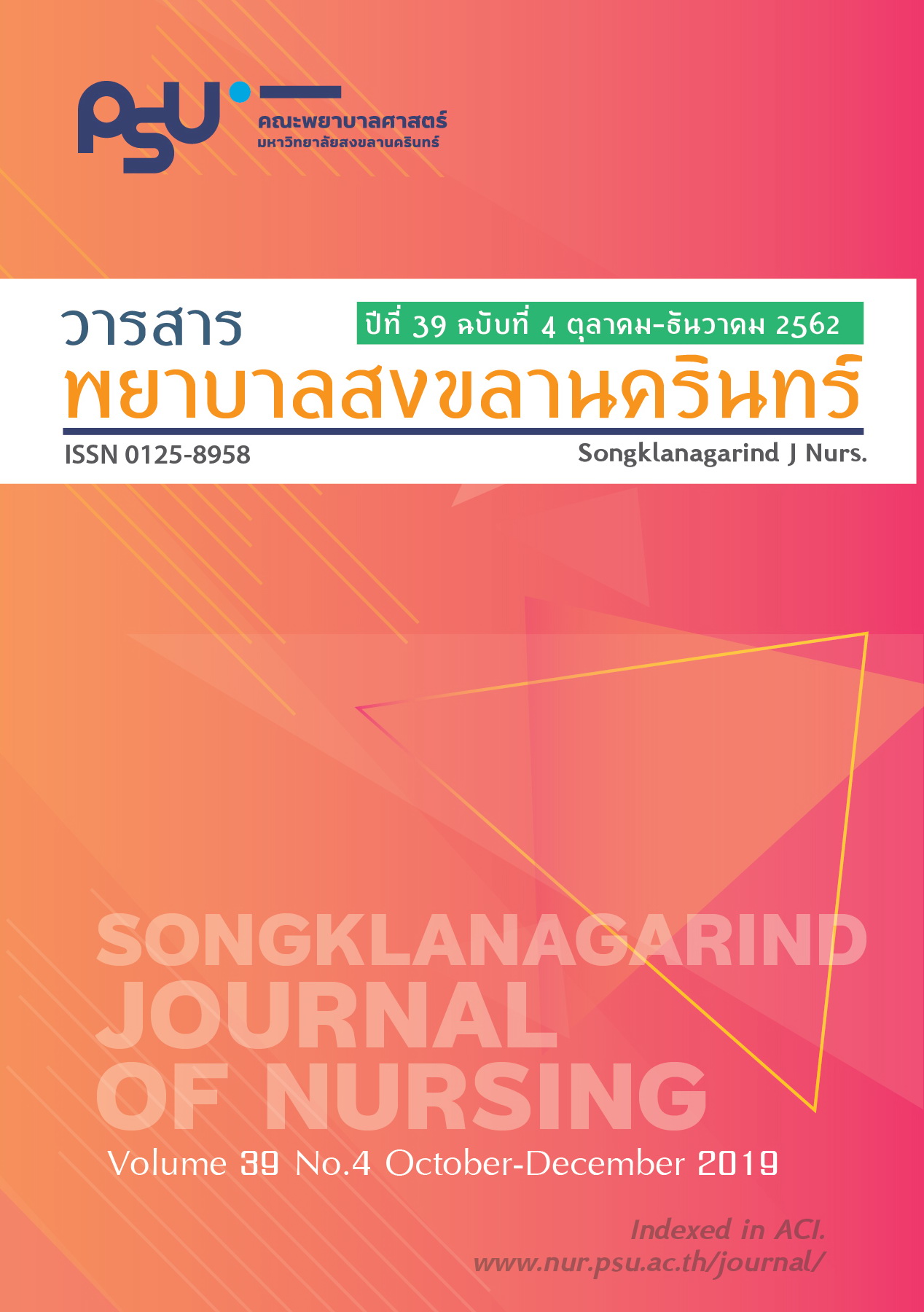Effects of the Nutritional Promoting Program on Nutritional Behaviors and Nutritional Status in Older Adults with Chronic Obstructive Pulmonary Disease and Malnutrition
Main Article Content
Abstract
This quasi-experimental research aimed to examine the effects of the nutritional promoting program on nutritional behaviors and nutritional status in older adults with chronic obstructive pulmonary disease (COPD) and malnutrition at a secondary hospital in southern Thailand. Purposive sampling was used to recruit 57 participants, divided into two groups: control-group (29) and experimental group (28). The control group received the usual care while those in the experimental group received the nutritional promoting program with the cooperation of patients’ relatives. The instruments used for data collection included: 1) nutritional food diary and 2) nutritional behaviors questionnaire. The reliability of the nutritional behaviors assessment questionnaire was .80 as tested by Cronbach’s alpha coefficient. Demographic data and health status were analyzed by using descriptive statistics, Fisher ‘s exact test and Chi-square. Hypotheses were tested by using independent sample t-test. and paired sample t-test.
The study results were as follows: The mean score of nutritional behaviors and nutritional status in the experimental group after receiving the nutritional promoting program were statistically significantly higher than before receiving the nutritional promoting program (t=25.01, p< .001 and t=5.19, p< .001, respectively). The mean score of nutritional behaviors in the experimental group after receiving the nutritional promoting program were statistically significantly higher than that of the control group (t=17.77, p< .001). The nutritional status in the experimental group after receiving the nutritional promoting program was not statistically significantly different from that of the control group (t=1.94, p> .05).
The results of this study indicated that the nutritional promoting program supported older adults to change their nutritional behaviors. Family caregivers were the key persons that could promote the older people with chronic obstructive pulmonary disease and malnutrition to continuously perform self-care. The results of this study indicated that the nutritional promoting program supported older adults to change their nutritional behaviors. Family caregivers were the key persons that could promote the older people with chronic obstructive pulmonary disease and malnutrition to continuously perform self-care.
Article Details
References
Wongprakod S, Wattanakitkrilert D, Pongthavornkamol K. The development of a clinical nursing practice guideline to support nutritional status in patients with chronic obstructive pulmonary disease at stable stage. Thai Journal of Cardio-Thoracic Nursing. 2009; 20(1):1-15. Thai.
Hodson M. Integrating nutrition into pathways for patients with COPD. Br J Community Nurs. 2016; 21(11): 548-52.
Jaiyen K. Selective factors related to health behaviors of Muslim patients with chronic obstructive pulmonary disease in the three southern border provinces [dissertation]. [Songkhla]: Prince of Songkla University; 2014. 121 p.
Moonwong T. Health promoting behaviors among the patient with chronic obstructive pulmonary disease. J Nurs Health Sci. 2012; 6(1): 75-83.
Rojsangruang R. Nutritional management in COPD [internet]. Bangkok; 2014 [cited 2018 Jul 8]. Available from: https://www.slideserve.com/vonda/nutritional-management-in-copd
Wells JR, Anderson ST. Self-efficacy and social support in African Americans diagnosed with end stage renal disease. ABNF Journal. 2011; 22(1): 9-12.
Wattanakitkrilert D. Nutritional care in patients with chronic obstructive pulmonary disease. J Nurs Sci. 2010; 28(3):13-21.
Pender N, Murdaugh C, Parson MA. Health promotion in nursing practice. 6th ed. Upper Saddle River, NJ: Pearson; 2011.
Pattarakantakul P, Donlao J. Effects of nutritional promotion program for chronic obstructive pulmonary disease patients with malnutrition. Nursing Journal of the Ministry of Public Health. 2017; 27(2): 69-79. Thai.
Buys DR, Campbell AD, Godfryd A, et al. Meals enhancing nutrition after discharge: Findings from a pilot randomized controlled trial. J Acad Nutr Diet. 2017; 117(4): 599-608.
Farooqi N, Nordström L, Lundgren R, et al. Changes in body weight and physical performance after receiving dietary advice in patients with chronic obstructive pulmonary disease (COPD): 1-year follow-up. Arch Gerontol Geriatr. 2011; 53: 70-5.
Laudisio A, Costanzo L, Di Gioia C, et al. Dietary intake of elderly outpatients with chronic obstructive pulmonary disease. Arch Gerontol Geriatr. 2016; 64: 75-81.
Ozeki T, Fujita Y, Kida K. Protein malnutrition in elderly patients with chronic obstructive pulmonary disease. Geriatr Gerontol Int. 2002; 2: 131-37.
Polit DF, Beck CF. Nursing research: Genrating and assessing evidence for nursing practice. 9 th ed. Philadelphia: Lippincott William & Wilkins; 2012.
Phonthep N, Wongpiriyayothar A, Sittipakorn. Effects of a rehabilitation program on functional capacity among chronic obstructive pulmonary disease patients with malnutrition. Journal of Nurses’ Association of Thailand, North-Eastern Division. 2013; 31(2): 44-53. Thai.
Khakhuen S, Jitramontree N, Wirojratana V, et al. Effect of the self-efficacy program on health behavior among older adults with chronic obstructive pulmonary disease. The Journal of Barommarajonani College of Nursing. 2018; 24(1); 57-71. Thai.
Rooney K, Cummins P. A service review of dietetic input for chronic obstructive pulmonary disease patients on long-term oral nutritional support. J Hum Nutr Diet. 2011; 24: 302-3.
Itoh M, Tsuji T, Nemoto K, et al. Under nutrition in patients with COPD and its treatment. Nutrients. 2013; 5: 1316-35.
Nordén J, Grönberg AM, Bosaeus I, et al. Nutrition impact symptoms and body composition in patients with COPD. Eur J Clin Nutr. 2015; 69(2): 256-61.
Kaewpitul S, Kaewpitul N. Nutritional status of elderly in Surin province [dissertation]. [Nakhon Ratchasima]: Suranaree University of Technology; 2012. 38 p. Thai.


